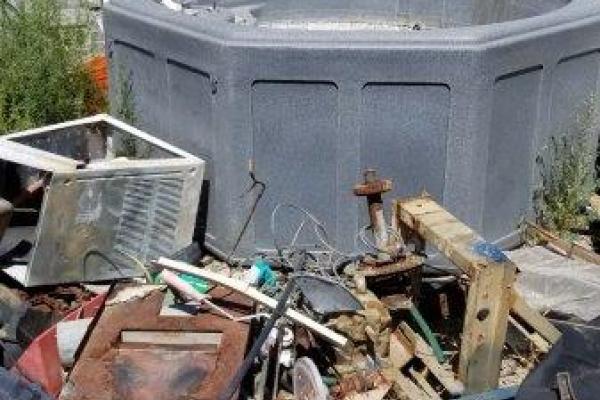Housing
The Environmental Health Department is responsible for ensuring that residential housing is safe, sanitary, and fit for human habitation. This is driven through investigations of complaints involving any housing sites. We work closely with Inyo County Building and Safety Department and the Planning Department for many of these issues.
Conditions addressed include, but are not limited to:
- Sewage discharge
- Nuisance odors
- Insect or Rodent infestations
- Damaged walls, floors, ceiling, roof
- Lack of hot/cold water
- Clogged, leaking or inoperable plumbing fixtures
- Lack of maintenance (heating, lighting, electrical, ventilation, swimming pools)
- Lead and Mold Hazards
- Unsanitary conditions (trash accumulation, animal droppings)
- For green pools / Mosquito breeding at private residences, please call the Owens Valley Mosquito Abatement Program, 760-873-7853
It’s getting warm outside and with the heat comes sped up biological activities at play on the piles of horse manure that gather at the hooves of the many equines populating local pastures. It’s not news that all that biotic action has associated with it a variety of pests and odors that are often offensive to the noses of those of us not so inclined to the equestrian lifestyle. As a result, my office gets its fair share of calls this time of year regarding this very issue. So I will try and spell it out as best I can what we’re dealing with here -- distilled down to its gritty regulatory essence -- the very definition of a Nuisance.
A nuisance is defined by the California Civil Code § 3479 as:
“ Anything which is injurious to health, including, but not limited to, the illegal sale of controlled substances, or is indecent or offensive to the senses, or an obstruction to the free use of property, so as to interfere with the comfortable enjoyment of life and property, or unlawfully obstructs the free passage or use, in the customary manner, of any navigable lake, or river, bay, stream, canal, or basin, or any public park, square, street, or highway, is a nuisance.”
Some of the examples above are very straight forward and easily interpreted, such as “illegal sale of a controlled substance”. I think most of us would agree that your neighbor selling drugs is indeed a nuisance. But some of these, such as “is indecent or offensive to the senses”, are quite subjective, especially in a town that calls itself the Mule Capitol of the World where ones man’s odorous nuisance is another man’s livelihood. So the Civil Code breaks it down more clearly in the next section, § 3480, which states:
“A public nuisance is one which affects at the same time an entire community or neighborhood, or any considerable number of persons, although the extent of the annoyance or damage inflicted upon individuals may be unequal.”
And then further, § 3481, defines a private nuisance as:
“Every nuisance not included in the definition of the last section is private.”
My interpretation of the above cited code sections is that any nuisance occurring in our horse manure scenario is due to the applicability of the phrase “is indecent or offensive to the senses…” and “… so as to interfere with the comfortable enjoyment of life and property…”. So, if the smell of your neighbor’s horse wafting your way on a warm summer breeze is ruining the nose of an evening glass of Chardonnay on the porch, then you do have a legitimate nuisance complaint, but your complaint is of the private more subjective sort and not the more indisputable public nuisance our neighborhood drug dealer represents.
So, before calling me for a private nuisance issue against your neighbor, I’d advise you to take it up nice and neighborly with them, maybe they can clean up after the horse more often in the summer months or come to some other cordial peace between the two of you, because all too often I see the “neighborly” evaporate into an all-out Hatfield and McCoy style conflict and nobody likes fighting with their neighbor.
Moreover, a private nuisance as this, just your nose vs. your neighbor’s nose, is so subjective that I, from an enforcement standpoint, have a hard time applying the Civil Code with any authority. I have to fall back on the County Codebook, sections 7.08.010 and 7.08.030, and its definition of solid waste and its removal:
“Solid waste” means all putrescible and non-putrescible solid, semi-solid, and liquid wastes, including garbage, trash, refuse, paper, rubbish, ashes, industrial wastes, construction and demolition wastes, abandoned vehicles and parts thereof, discarded home and industrial appliances, de-watered, treated, or chemically fixed sewage sludge which is not hazardous waste, manure, vegetable or animal solid and semi-solid wastes, and other discarded solid and semi-solid wastes.”
Then, regarding the removal of solid waste:
“Solid waste created, produced or accumulated in or about a residence or residences, whether single or multiple family, or other place of human habitation shall be removed from the premises at least once a week.”
So, the solid waste definition specifically includes manure and animal waste products and needs to be removed at least once a week, though manure that is properly worked into the soil, in a manner that does not create a nuisance, i.e. composting, is not considered to be solid waste.
Where does that leave us? Well, every summer is bound to have a few nuisances to go with all the long-day fun, all I’m asking for is that if that nuisance involves something about your neighbor, see if you can’t work out your differences with the tact and nicety you’d expect from your neighbor if they came knocking on your door. Because honestly, I am the surefire buzz kill you don’t want knocking on your door this summer.

